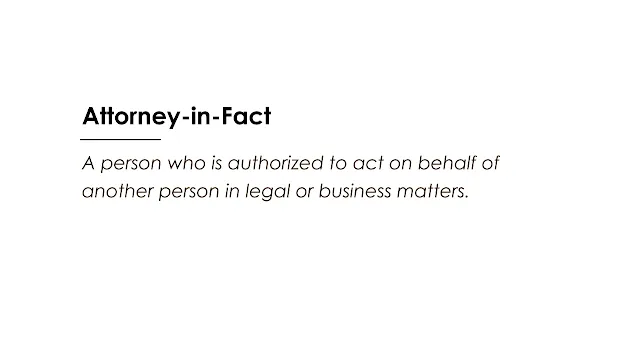 |
| Image: Moneybestpal.com |
An attorney-in-fact is a person who is authorized to act on behalf of another person in legal or business matters.
The one giving this authority is referred to as the principal, and the one receiving it is referred to as the agent. By approving a document known as a power of attorney (POA), the principal can specify the extent and length of the agent's authority.
A POA might be specific, limiting the agent's authority to a specific situation or transaction, or general, providing the agent broad permission to address a variety of issues. A POA can also be non-durable, which means it expires when the principal becomes incapacitated, or durable, which means it continues to be effective even if the principal becomes incapacitated.
Lawyers are not required to be attorney-in-fact. Actually, the principal has the authority to appoint any capable and reliable person as an attorney-in-fact. Although some states might stipulate that the agent must reside in the same state as the principal or be related to the principal in some way—for example, as the principal's spouse, parent, child, or sibling—others might not.
A POA's instructions and restrictions must be followed, and an attorney-in-fact is required to operate in the principal's best interests and in good faith. All transactions and decisions undertaken on behalf of the principal must be accurately recorded by the attorney-in-fact, who must also disclose them to the principal or to a third party as needed, depending on the law or the power of attorney (POA).
An attorney-in-fact's authority ends when the POA expires, when the principal revokes it, when the principal dies, or when a court terminates it. If a court determines that the agent has abused their authority, violated their fiduciary obligation, or become incapable, the POA may be revoked. A court or the principal may get notification of an attorney-in-fact's resignation.
Attorney-in-fact and attorney-at-law, which is another name for a lawyer, are occasionally used interchangeably. These phrases are not interchangeable, though. A practitioner with a license to practice law and represent clients in court cases is known as an attorney-at-law.
A representative with the power to act on behalf of another in non-legal situations is known as an attorney-in-fact. Although an attorney-in-fact may consult with and work with an attorney-at-law, neither one makes decisions on behalf of the principal.
The idea of an "attorney-in-fact" is founded on the agency rule of common law, which permits one person to assign their legal rights and obligations to another. Before drafting or accepting a POA, it's crucial to seek legal advice because agency law varies from state to state.
An attorney can assist in creating a POA that complies with legal standards and reflects the principal's preferences. A lawyer can also assist in resolving any disagreements or problems that might develop between the agent and third parties or between the agent and the principal.
The following are some examples of situations where an attorney-in-fact may be useful:
- A frequent traveler may appoint an attorney-in-fact to take care of their financial affairs while they are abroad, including paying bills and filing taxes.
- An attorney-in-fact can be chosen by a person who owns property in another state to sell or rent that property on their behalf.
- If a person receiving medical treatment becomes unable to make choices for themselves, they may appoint an attorney-in-fact to act on their behalf.
- A person who wishes to make arrangements for the future may designate an attorney-in-fact to manage their affairs in the event that they are rendered incapable due to illness, injury, or old age.
About 15 million adults in the U.S. have designated an attorney-in-fact through a durable POA, according to latest data from 2023. As more people learn about the advantages of having a representative who can uphold their interests and wishes in the event of incapacity, this number is anticipated to rise.
However, there are also some challenges and risks associated with appointing an attorney-in-fact. Some of these include:
- Locating a qualified, trustworthy, and capable individual to serve as an agent
- Describing the agent's authority's sphere and bounds in unambiguous terms
- Keeping an eye on and evaluating the agent's performance
- Preventing overlapping interests or undue influence from the agent or others
- Preventing the agent or third parties from engaging in fraud, abuse, or exploitation
As a result, it is suggested that anyone thinking about appointing an attorney-in-fact speak with a lawyer about their alternatives and preferences.
A lawyer can assist in making sure the POA is legally legitimate, enforceable, and represents the principal's interests and intentions.
